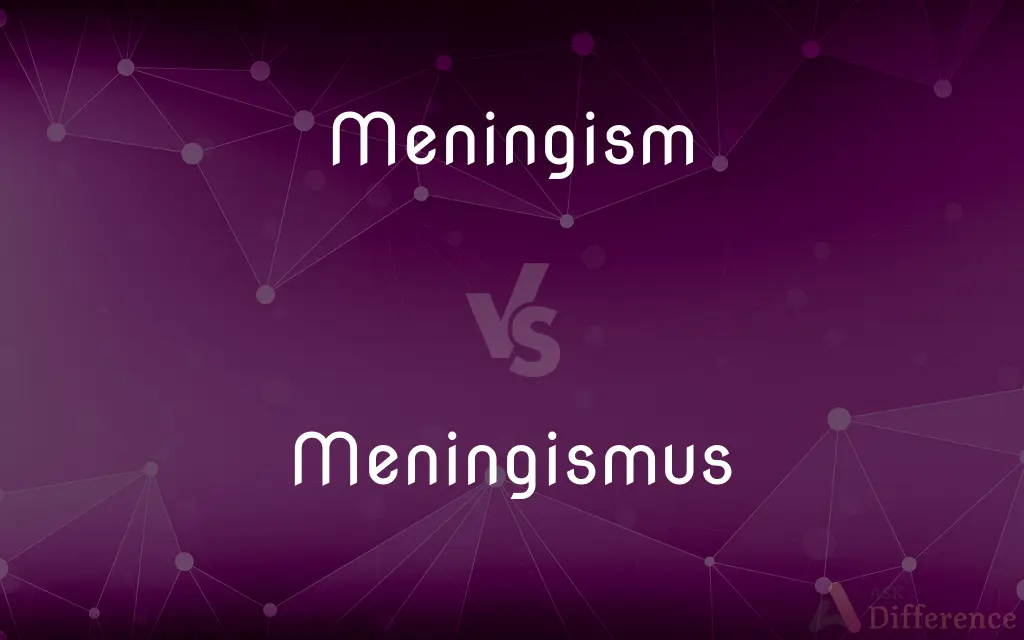Meningism vs. Meningismus — What's the Difference?
Edited by Tayyaba Rehman — By Urooj Arif — Updated on April 7, 2024
Meningism involves symptoms mimicking meningitis without actual inflammation, whereas meningismus is specifically the triad of neck stiffness, photophobia, and headache.

Difference Between Meningism and Meningismus
Table of Contents
ADVERTISEMENT
Key Differences
Meningism presents as a set of symptoms resembling meningitis, such as headache, fever, and neck stiffness, but without the actual inflammation of the meninges. This condition can be seen in various non-infectious and infectious scenarios, including severe migraines or after a subarachnoid hemorrhage. On the other hand, meningismus is a term often used interchangeably with meningism but specifically refers to the clinical triad of neck stiffness, photophobia (sensitivity to light), and headache, suggesting meningeal irritation without confirmed infection or inflammation.
While meningism can be a broader term encompassing any sign or symptom that mimics those of meningitis, meningismus narrows down to particular symptoms indicating irritation of the meninges. This distinction is crucial for clinicians to determine the necessary diagnostic approach and management plan.
Meningism does not necessarily imply an underlying bacterial or viral infection, meaning that a lumbar puncture might not show the pathogens typically associated with meningitis. Whereas, meningismus, despite also not confirming meningitis through such tests, prompts immediate investigation to rule out potential life-threatening conditions that could present similarly.
In the context of patient evaluation, a diagnosis of meningism might lead a healthcare provider to consider a wide range of differential diagnoses, including intracranial hemorrhage, whereas meningismus, due to its more specific symptom triad, might steer the evaluation more towards ruling out actual meningeal infection.
The treatment for meningism and meningismus primarily focuses on addressing the underlying cause and relieving symptoms. However, the approach to meningismus may include more aggressive measures to exclude meningitis, such as empirical antibiotics, until bacterial meningitis can be definitively ruled out.
ADVERTISEMENT
Comparison Chart
Definition
Symptoms mimicking meningitis without inflammation.
Specific triad (neck stiffness, photophobia, headache) indicating meningeal irritation.
Symptoms Included
Headache, fever, neck stiffness, among others.
Mainly neck stiffness, photophobia, and headache.
Indicative of
Broad range of conditions, both infectious and non-infectious.
Closer indication of meningeal irritation.
Diagnostic Approach
Wide-ranging, considering various potential causes.
More focused on excluding meningitis.
Treatment Focus
Addressing the underlying cause; symptomatic relief.
Empirical treatment for meningitis until ruled out.
Compare with Definitions
Meningism
A condition mimicking the symptoms of meningitis without actual meningeal inflammation.
The patient's meningism was later found to be due to a viral infection elsewhere in the body.
Meningismus
Indicative of the need for careful evaluation for potential meningeal infection.
The presence of meningismus in a patient without fever led to a broad differential diagnosis.
Meningism
Signs that suggest meningitis but without confirmed infection.
Despite the alarming signs of meningism, the lumbar puncture results were clear.
Meningismus
A clinical finding often leading to the investigation for meningitis.
Her meningismus was so pronounced that meningitis was initially suspected.
Meningism
The presence of meningeal signs in the absence of an actual infection of the meninges.
Meningism can be confusing for clinicians due to its similarity to true meningitis symptoms.
Meningismus
Specifically, the triad of neck stiffness, photophobia, and headache without actual inflammation.
Meningismus prompted an immediate but cautious response from the emergency department.
Meningism
A clinical presentation including neck stiffness, headache, and possibly fever, without bacterial or viral meningitis.
Her symptoms of meningism led to further tests to rule out other neurological conditions.
Meningismus
The presence of specific symptoms indicating irritation of the meninges.
The patient's meningismus was unsettling but ultimately not linked to an infectious cause.
Meningism
Symptoms like those of meningitis caused by various non-meningitic factors.
After ruling out meningitis, they considered migraine as a cause for his meningism.
Meningismus
A term sometimes used synonymously with meningism but with a focus on the triad of symptoms.
Despite the clear signs of meningismus, all tests for meningitis came back negative.
Meningism
Meningism is a set of symptoms similar to those of meningitis but not caused by meningitis. Whereas meningitis is inflammation of the meninges (membranes that cover the central nervous system), meningism is caused by nonmeningitic irritation of the meninges, usually associated with acute febrile illness, especially in children and adolescents.
Meningism
(medicine) A set of symptoms similar to those of meningitis but not caused by it, involving the triad of nuchal rigidity (neck stiffness), photophobia, and headache, a sign of irritation of the meninges.
Meningism
Such symptoms as identified clinically but before knowledge of their cause is ascertained (that is, before diagnosis or before its confirmation); meningeal symptoms.
Meningism
Symptoms that mimic those of meningitis but without inflammation of the meninges
Common Curiosities
What is meningism?
Meningism involves symptoms that mimic those of meningitis, such as headache and neck stiffness, without actual inflammation of the meninges.
What causes meningism?
Meningism can be caused by a variety of conditions, including infections elsewhere in the body, migraines, or after a brain injury.
How does meningismus differ from meningism?
Meningismus specifically refers to the triad of neck stiffness, photophobia, and headache, indicating meningeal irritation without proven infection.
How are meningism and meningismus treated?
Treatment focuses on the underlying cause; for meningismus, empirical treatment for meningitis might be started until it's ruled out.
Are meningism and meningismus common?
Both conditions are relatively uncommon and usually warrant careful evaluation by healthcare providers.
Can children have meningism or meningismus?
Yes, both conditions can occur in children and adults, often requiring prompt medical attention in younger patients.
Can meningism or meningismus indicate a serious condition?
Yes, both can be signs of serious conditions, necessitating thorough investigation to rule out meningitis or other life-threatening diseases.
What leads to meningismus?
Meningismus is often indicative of meningeal irritation, which could be due to a benign or more serious cause that requires investigation.
Is a lumbar puncture necessary for diagnosing meningism or meningismus?
A lumbar puncture may be performed to rule out actual meningitis when meningismus is present, though not always necessary for meningism without specific symptoms.
What diagnostic tests are used for meningismus?
Beyond a lumbar puncture, CT or MRI scans might be used to investigate the cause of meningismus.
What symptoms are most indicative of meningismus?
The specific triad of neck stiffness, photophobia, and headache is most indicative of meningismus.
Can meningismus be a symptom of other diseases besides meningitis?
Yes, it can indicate other conditions causing meningeal irritation, not just meningitis.
Do all patients with meningism or meningismus require hospitalization?
Not all, but hospitalization may be necessary for thorough evaluation and treatment, especially if meningitis is suspected.
Share Your Discovery

Previous Comparison
Oriented vs. Orientated
Next Comparison
Inexistent vs. NonexistentAuthor Spotlight
Written by
Urooj ArifUrooj is a skilled content writer at Ask Difference, known for her exceptional ability to simplify complex topics into engaging and informative content. With a passion for research and a flair for clear, concise writing, she consistently delivers articles that resonate with our diverse audience.
Edited by
Tayyaba RehmanTayyaba Rehman is a distinguished writer, currently serving as a primary contributor to askdifference.com. As a researcher in semantics and etymology, Tayyaba's passion for the complexity of languages and their distinctions has found a perfect home on the platform. Tayyaba delves into the intricacies of language, distinguishing between commonly confused words and phrases, thereby providing clarity for readers worldwide.














































